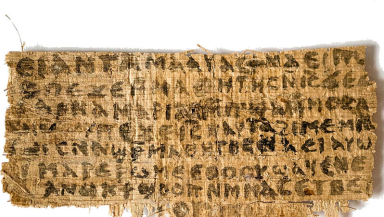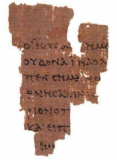
Was Jesus married? The discovery of a Coptic papyrus fragment which referred to his "wife" – and dubbed "The Gospel of Jesus' Wife" – seemed to say so, in the face of 2,000 years of Church tradition.
The academic who publicised it in 2012, Dr Karen King, was anxious to avoid sensationalism: she said it didn't prove anything of the kind. However, conspiracy theorists and lovers of Dan Brown's Da Vinci Code were undeterred, seizing on the reluctance of the Church to entertain the idea as proof that it was just trying to suppress an inconvenient truth.
However, since the discovery of the fragment was announced in September 2012, an academic consensus has been building that it is a very modern forgery, dating to as recently as after 2009.
Now Cambridge University's New Testament Studies journal has devoted an edition to the controversy, with contributions from leading scholars providing damning critiques of the fragment.
One of them, Dr Christian Askeland, has made an intensive study of the text. He found that it was made with the same ink, the same writing implement and showed the same handwriting as a fragment from John's Gospel, written in the Lycopolitan Coptic dialect – which itself was copied almost exactly from a 1924 book on a Lycopolitan John's Gospel found in a jar at Qau el-Kebir the previous year. Askeland argues that since both were written by the same person and that one is definitely a forgery, so is the other. Furthermore, the Lycopolitan dialect had died out by the 6th century – 200 years before the date of the manuscript (King had originally claimed it dated from the 4th century, but later testing gave a date from the 8th).
Karen King and the Harvard Theological Review have continued to defend the authenticity of the "Gospel of Jesus' Wife", saying that even if it had been copied from earlier sources, this could have been done in antiquity.
However, its origins are murky, to say the least. According to the Harvard Theological Review, the earliest documentation is a bill of sale dated November 12, 1999, stating that the former owner had acquired six pieces of papyrus in 1963 in Potsdam (then East Germany). Accompanying it is an unsigned, undated handwritten note indicating that a Professor Fecht believed it to be evidence for a possible marriage of Jesus. An anonymous collector approached Karen King for her opinion on the text, which he said he had purchased with five others from a German man, Hans-Ulrich Laukamp, in the 1960s.
It's an extraordinary story, bringing to mind famous forgeries such as the Piltdown Man, "discovered" in 1912 and not revealed as a hoax until 1953, and the 1983 fake Hitler Diaries scandal.
Askeland told Christian Today: "We can not know for sure why the forger created this manuscript. S/he may have wanted to earn some money through deception. Some have speculated that the forgery was playing to the tune of the Da Vinci Code narrative, which apparently includes a married Jesus and a Harvard professor.
"Perhaps the papyrus creation was just a joke which went horribly wrong and the mortified prankster has withdrawn into hiding, never having imagined that the fake could have become the basis for a Smithsonian documentary and a Harvard Theological Review special issue, both released prominently before Easter.
"Maybe, the forger was trying to support or discredit a liberal ideology. I can only guess that, were we to know the whole story, the history would be more complicated – and perhaps ridiculous – than anything that one could now reconstruct."
Askeland also says that the supporting documents were forged, and that it was likely that it was after 2009 because by then two professors at the Freie Universität in Berlin who were said to have seen the papyri were dead.
"Although one can not be sure that the perpetrator was targeting Karen King, who was resident at the FU-Berlin when the manuscripts were purportedly identified there, they apparently had someone like Karen King in mind – someone with her interests and publishing history."
Askeland believes that the controversy is settled: "Now, the smoking guns are beginning to pile up upon one another into a teetering heap, and no bona fide academic wants to publicly defend the text." However, while for serious academics the discussion might be over, he's not optimistic that the "Jesus' Wife" thing will simply disappear; it will provide a talking point for pundits and ideologues for years to come.
And was Jesus ever married? One of the interesting things about this strange story is why the question seems to be so important. We're not told one way or the other, so the honest answer is that we don't know. However, whenever the issue comes up it seems to touch a nerve among Christians who are adamant that Jesus was single and celibate. Certainly, some Christian traditions have an interest in believing he was – it would be much harder for the Roman Catholic Church to argue for a celibate priesthood if he wasn't, for instance.
Perhaps at the root of the reluctance to entertain the idea is a fundamental squeamishness about sex – we simply can't associate the idea with Jesus at all. We might need to think a little harder about that, though; fully human means fully human, and it's hard to see why in principle incarnation should exclude such an ordinary part of human experience.
Was he married? We don't know. What's clear, however, is that the "Gospel of Jesus' Wife" provides no support at all for thinking that he was.
Follow @RevMarkWoods on Twitter.

















